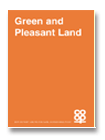Pesticide Concerns
|
In a recent survey of Cooperative members (Jan 2008) , when asked what they considered important in a Food Ethics Policy, 98% said "pesticide reduction". An earlier survey found that consumer concerns, about food grown using pesticides, were "fuelled by secrecy in the food and agrochemical industries". The findings are summarised (below) and in the Co-operative publication Green and Pleasant Land (pdf). The Co-operative Food’s supplier guidelines on pesticides were first produced in 2001. Later, the Co-operative set up a Pesticide Advisory Committee to produce a list of pesticides of particular concern. This committee worked out a method to determine which pesticides are 'Banned' 'Prohibited' or 'Monitored' by identifying those with the greatest inherent hazards - whether to the environment or to people. This is called the "hazard-trigger approach" (click for details). Building on its own Code of Practice, the introduction of a Pesticide Policy in 2006 emphasises the importance of good crop/environmental management, operator safety and non-chemical methods of control, as preventative ways to reduce pesticde residues. In 2007 a new online pesticide portal website to help growers and suppliers manage pesticide use was launched. These pages show you how that portal website works. Customers opinions were sought by the Cooperative about disclosure of pesticide use, Food stores and manufacturers should tell people about pesticide residues New Roles & Responsibilities The Cooperative online Pesticide Code of Practice aims to be both a learning and an audit tool. The Co-operative wants to educate and involve suppliers, growers and other stakeholders in developing ways of reducing pesticide use. The Code sets out the steps we can now take using web based systems. By taking the steps on this e-path we will find out about the pesticides and ways we can work to reduce their use. This will need to recognise our roles in relation to the other people involved. Different people have different roles to demonstrate good pesticide practice. eg if you are a Co-operative Supplier, you will want to find out who is using pesticides on Prohibited list (and whether they have 'Permits'). Whereas it is a grower's responsibility to inform the supplier of any pesticide use that contravenes the Code. Cooperative Retail's role will be to identify where suppliers are having greatest difficulty in reducing the use of the more toxic pesticides. Resources can then be directed to support with whatever measures are required. With the demise of Extension Services throughout the world, Cooperative Retail recognises its responsibilities throughout their supply chain. Cooperative Retail is aware that there is a general move for retailers to develop systems that are more "sustainable". |

91%
|
|

